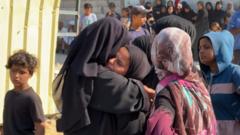With millions facing starvation, the GHF's aid boxes, containing essential calories but lack vitamins and minerals, spark critical concerns from nutrition experts as Gaza's water and fuel crisis worsens.
Nutritional Concerns Arise Over GHF Food Aid Boxes in Gaza Amid Starvation Crisis

Nutritional Concerns Arise Over GHF Food Aid Boxes in Gaza Amid Starvation Crisis
The Gaza Humanitarian Foundation’s food aid boxes are criticized for inadequate nutritional value amidst an escalating humanitarian crisis.
More than two million Palestinians in Gaza are in dire need as they confront a rapidly deteriorating starvation crisis, with the United Nations reporting increasing deaths attributed to malnutrition. The Gaza Humanitarian Foundation (GHF), which operates with backing from Israel and the US, claims that it has distributed around 91 million meals mostly through food aid boxes since late May.
Despite multiple reports emerging, independent verification of the contents of these boxes remains challenging, as international journalists have been barred from entering Gaza. A review of posted images and testimonials, however, indicates that the boxes predominantly contain dried items like pasta, chickpeas, lentils, and wheat flour, alongside cooking oil, salt, and tahini. The GHF mentioned that a single food box can provide 42,500 calories, supposedly feeding 5.5 people for approximately 3.5 days.
Nonetheless, scrutiny from nutrition experts raises alarms over these food packages. Professor Stuart Gordon from the London School of Economics critiqued the nutritional integrity of the offerings, stating while sufficiency in calories is present, the overall dietary quality is severely lacking. He explained that such limited food variety can ultimately lead to "hidden hunger," increasing the susceptibility to nutrition-related diseases.
Furthermore, Dr. Andrew Seal from University College London noted the deficiencies in essential nutrients, including calcium, iron, and a range of vitamins. This deficiency is particularly concerning for young children and poses significant risks if the aid leads to prolonged consumption of these food items.
In parallel, the ongoing water crisis in Gaza complicates the situation, as recipients of aid boxes need access to water and fuel to prepare these staple foods. The UN's Office of Humanitarian Affairs recently alerted that the region's water conditions are gravely worsening, with families turning to unsafe cooking options due to surging prices for cooking gas.
UN Secretary-General António Guterres highlighted that the malnutrition crisis is exacerbating, with nearly one in three residents going for extended periods without food. The World Food Programme has also indicated that significant numbers of women and children in Gaza require urgent nutritional assistance. The GHF has yet to respond to inquiries regarding the nutritional guidance for their food aid.

















